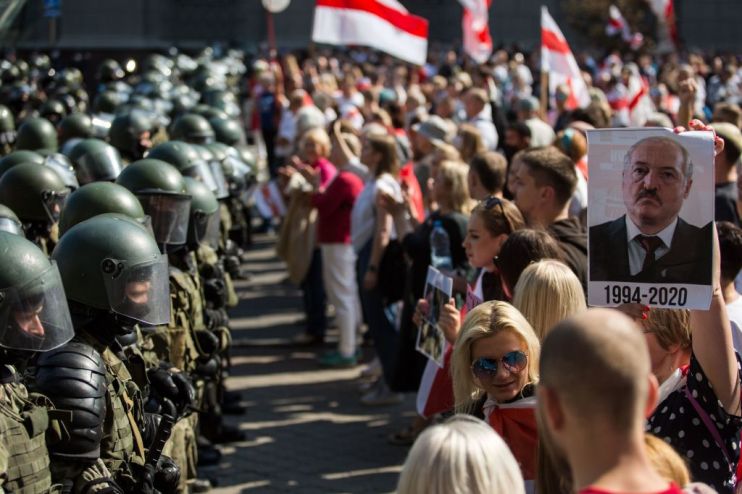Putin holds all the cards in Belarus

One of the greatest problems in political risk analysis is that the heart so often gets the better of the head.
Because we want a political outcome to happen, we think that it will. Karmic justice must apply to all situations in history, with the good rewarded and the bad punished.
But this is to not know any history at all. And, as Cicero aptly put it, “those who do not know history will forever remain children”.
Childlike is the only way to describe the mainstream western views of the current crisis in Belarus, where thuggish President Alexander Lukashenko’s long stint in power is imperiled by mass demonstrations protesting his inept stealing of the recent presidential election. Just because Russian President Vladimir Putin — the main actor in the drama — is wicked does not mean he is fated to lose.
Left to his own fate, Lukashenko would probably fall. This, after all, is a man who loudly proclaimed the drinking of vodka as a cure for coronavirus; we are not dealing with a rocket scientist here. However, Belarus is merely a plaything in a much larger poker game for regional power, where Putin holds all the cards.
Indeed, less reported on but equally important to the Russian President, at the same time as Belarus has exploded thousands have been protesting in Siberia over Putin’s high-handed removal of the popular governor of Khabarovsk. Putin fears that to give in over the brewing revolution in Belarus could well have a negative demonstration effect in mother Russia itself.
Fortunately (from Putin’s point of view), he does not have to give in. Indeed, taking advantage of the crisis, the Russian President is supporting Lukashenko for the price of more closely integrating Belarus into Russia’s direct control.
Even the protest leaders have made it clear their movement is not anti-Russian, nor are they advocating EU or Nato membership for Belarus, which would be anathema to the Kremlin. For they know who is ultimately running the show.
Putin knows he has the west over a barrel regarding Belarus. He will always care more geo-strategically about what is happening in his backyard than will the far-away west, just as the US cares far more about who governs next-door Mexico than does China.
So while Putin recognises that Belarus is a peripheral western concern, he also knows that for Russia it is primary, if Moscow’s immediate sphere of influence is to be maintained.
Due to all this, and confident that Europe will not do more than wring its hands, Putin has acted with decisive confidence. Over the past week, the Kremlin has moved to restructure $1bn in Belarusian debt, sent Russian broadcasters to man Minsk’s state-owned television channels, and made it crystal clear that if the demonstrations increase, Russia is prepared to send troops into Belarus to decisively prop up Lukashenko.
Finally, Putin has (almost certainly) ordered the poisoning of Alexei Navalny, the foremost Russian opposition leader.
This last event is the decisive clue as to Putin’s political risk thinking, as well as his correct gaming out of European political impotence.
Navalny was poisoned in Tomsk airport, while returning to Moscow from leading the Siberian protests. As well as bolstering Russia’s Belarus policy, dealing with Navalny vastly lessens the chances that the Siberian demonstrations could truly threaten Putin’s regime, as the Russian anti-corruption campaigner has emerged as the only (just about) possible direct personal threat to his continued rule.
Propping up Lukashenko and poisoning Navalny are two sides of the same coin in terms of Putin’s strategy.
Putin gamed Europe — and its leading country Germany — out perfectly. After Navalny was flown to Berlin for emergency treatment, the German doctors found (surprise, surprise) that he had been poisoned.
Ever-hapless German Chancellor Angela Merkel then proved Putin’s analysis of European hypocrisy on the money. With one breath Merkel insisted that Navalny’s poisoning raised “very serious questions that only the Russian government can answer and must answer”.
With the next breath, she made it clear that she was prepared to do absolutely nothing of consequence to call the Kremlin to account, adamantly proclaiming that Berlin will press ahead with the Nord Stream 2 pipeline with Moscow — which will double the amount of gas brought into Europe from Russia.
Putin, as ever, read Europe correctly; Wilsonian principles would not be allowed to get in the way of German commerce.
All this makes for a dire story, one where at least in the short run the bad guys win. But the only way to best Putin over the long haul is to let the head rule the heart, and to out-think him. Only then will the bad guys lose.
Main image credit: Getty